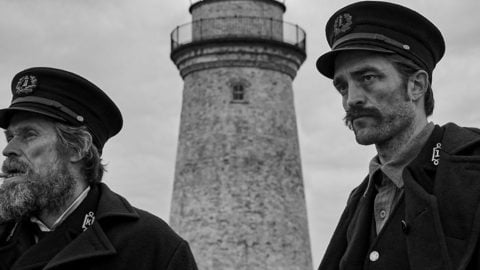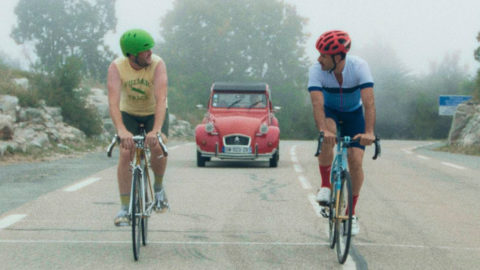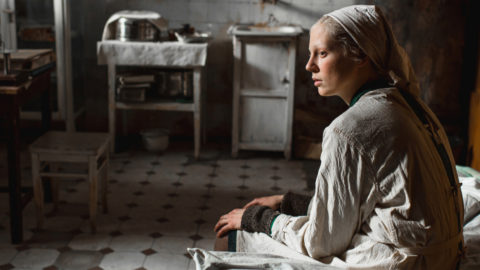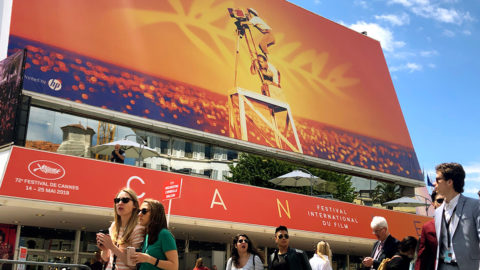Cannes Dispatch: And Then We Danced
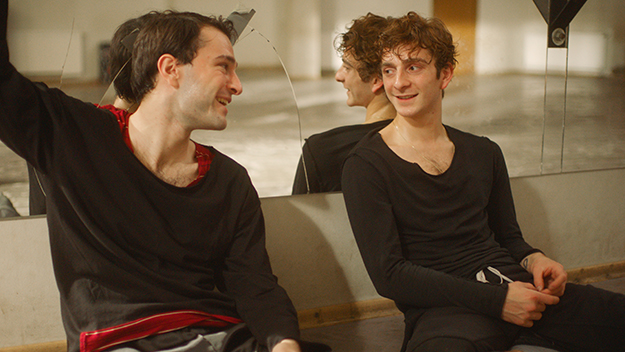
Bachi Valishvili and Levan Gelbakhiani in And Then We Danced (Levan Akin, 2019). Photo by Lisabi Fridell
While the Cannes Film Festival can stoke industry and artistic interest through its gala premieres, local audiences in a movie’s home country can have a very different reaction to the buzz. That’s definitely the case for And Then We Danced—a quietly revolutionary movie that is now garnering attention in the former Soviet republic of Georgia, where its story is set.
This enormously charming queer dance film debuted in the Directors’ Fortnight sidebar here a few days ago to great acclaim. Instagram accounts for the director, Levan Akin, and his star, Levan Gelbakhiani, a 20-year-old dancer from Tblisi, are blowing up with international attention and curiosity about the film back home. But in Georgia—a country that retains a conservative, homophobic mainstream culture—Akin’s tender, celebratory, and subversive film is also drawing an outcry.
It was seven years ago this week that Georgia’s first LGBTQ pride march was followed by protests and violence in Georgia’s capital city of Tblisi, impelling Akin to make a movie that explores young gay lives there now. A Swedish-born director of Georgian descent and a former dancer himself, Akin began researching the lives and stories of young Georgians and found a rich dichotomy between cultural expression and old-fashioned values in the world of traditional Georgian dance. Based on stories that he gleaned after embedding himself with young people there, Akin has crafted a seemingly simple coming-out story, but one that is rooted in a risky, forbidden topic in Georgia where homosexuality is denied and dangerous.
“I had always wanted to do something in Georgia because growing up in the Georgian diaspora, I had this romantic idea of Georgia, an idealized view. The polyphonic singing, the dancing, the wine, the food,” Akin said in a conversation with Film Comment this past weekend in Cannes. “But for young people in Georgia [the past] represented patriarchy. The older folks made it repressive and I felt ashamed [of that past].”
The roots of the traditional Georgian dance called Kintouri can be traced through a specific group of queer Georgians and Armenians who lived in Tblisi at the turn of the last century, Akin explained. They were a lower, service class of waiters and sellers, but became an accepted gay community that was recognized up until they were suppressed in the Soviet era. Their dancing remains a part of the cultural history of Georgia, even though this legacy of their identity has been quashed.
“They did this dance and it’s almost like Paris Is Burning,” Akin noted, referencing the balls and voguing seen in Jennie Livingston’s landmark 1990 documentary. Men danced with men, posing their hands in gestures alongside their faces in vogue-like moves and bouncing forcefully to the rhythmic beats of traditional drums and instruments. The dances can seem sensual and quite intimate, Akin said of those moves that are the roots of today’s traditional Georgians dances.
“They were doing these dances and had these stories around these dances, but the moves were appropriated by traditional dancers and now they have erased away all of the homosexuality in those dances,” Akin explained. Any homoerotic roots to these dances are now officially denied, he added.

Bachi Valishvili, Levan Gelbakhiani, and Ana Javakishvili in And Then We Danced. Photo by Anka Gujabidze
At the center of And Then We Danced, which is Akin’s third feature film, is a love triangle among dancers. The expressive and endearing Merab (Levan Gelbakhiani) is a young man struggling under the training of a master dancer who challenges the femininity of his moves. He is in a burgeoning romance with his stage partner Mary (Ana Javakishvili), until the arrival of Irakli (Bachi Valishvili), a talented traditional dancer who immediately catches his eye and then returns his gaze. The two men never speak of their attraction on screen—the homophobic culture of today’s Georgia prevents them from pursuing it—but they do eventually act on their urges even with the inherent danger of that intimacy.
“It’s about redefining tradition, redeeming the norms of masculinity, and the prison that surrounds you because of gender norms,” Akin said. “I wanted to show this kid and his story—that this is a normal kid, from Tblisi, who just happened to fall for another guy.”
For some, the playfulness and knowing glances between Merab and Irakli will evoke Elio and Oliver in the recent Call Me by Your Name, as does a flirtatious dance scene set to the Robyn track “Honey.”
The queer coming-of-age film—the coming-out story—is familiar to Western gay and lesbian audiences. It follows a vibrant tradition of such stories that can be found in a canon of LGBT cinema that most recently includes such movies as Pariah (2011), Moonlight (2016), and God’s Own Country (2017). Contemporary explorations from conservative, repressive cultures can be hard to come by on the big screen, which is what makes And Then We Danced unique and important.
Yet queer films in homophobic countries can be dangerous to make. Numerous on-screen credits for those who worked on the film locally in Georgia, including the choreographer, are listed as “Anonymous” to maintain their safety. Bodyguards were stationed on set to protect cast and crew—and the real story of a gay Georgian dancer who was beaten and exiled found its way into the film’s story line.
Now that the film is finished, Akin is calling out those who tried to sabotage its production. Early on he sought support from Georgia’s prestigious Sukhishvili Ensemble, he said. The head of the dance company told him, “There are no gay people in Georgian dance,” and then actively campaigned against the film, trying to halt the participation of others.
After that, Akin kept his film’s story line under wraps, shooting in secret and hiding its more intimate scenes to protect cast and crew from protest or even violence. Akin and his producers are currently mapping out a strategy to get the film out to Western audiences. Word of mouth from early Cannes screenings has stoked buyer interest, but they are also focused on finding a way to show the movie in Georgia to those it reflects.
“Georgian LGBTQ live 50 double lives,” Akin said, reiterating that his film is based entirely on the stories of real people living in Georgia today. “There’s never been a movie like this from that region of the world, never this blatantly open. Hopefully, this movie somehow can reach a platform for these kids.”
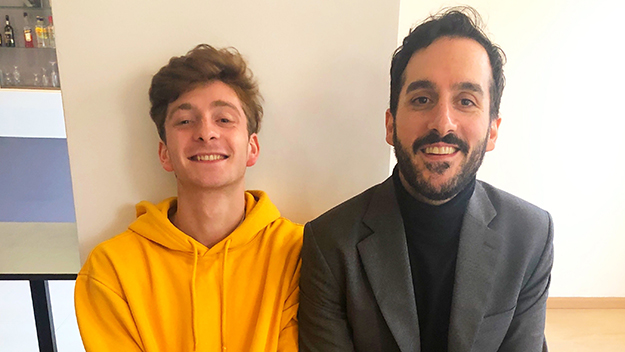
Levan Gelbakhiani (left) and Levan Akin (right). Photo by Eugene Hernandez
Despite the opposition and the risks, the film is a “game changer” for Georgia, Akin said, beaming. “I think Georgia has had four or five movies in Cannes ever,” Akin said. “There is a huge debate going on there now because of this film and all of the attention it is receiving. In Georgia the trolls, the haters are so vocal, but in Georgia that’s the norm. These kids are in the minority.”
Young dancer Levan Gelbakhiani, the vibrant star of And Then We Danced, is one of those kids. Gelbakhiani was all smiles over the weekend as he embraced the attention and awareness he was getting in the wake of the film’s debut. On screen, he moves with the brightness and innocence of Timothée Chalamet in Call Me by Your Name, so perhaps the comparisons are fitting.
“I found him on Instagram a year and a half ago,” Akin recalled. “He was hesitant to meet.” Akin asked Gelbakhiani to share diary entries from scenes in his own life and the two became close when the filmmaker immersed himself in Gelbakhiani’s social circle.
“They are all so brave to be in this movie,” Akin said of his cast and crew in Georgia. “For me, I would never have had that confidence that they have. For those kids in Georgia the situation is still like that and it’s even worse. Still in 2019, for them to have this movie that means everything. That’s all I care about. All I care about is for something hopefully to change.”
Now, the filmmaker is clearly protective of his young collaborator. At the end of our interview, the two Levans sat next to each other, looking straight ahead at me as I composed an iPhone photo. Gelbakhiani glanced over to Akin on his left and then Akin caught his look and turned to look at him. They laughed playfully.
“He is the movie to me,” Akin said of Gelbakhiani. “Without him, I probably wouldn’t have made it. He is the movie. It rests on his shoulders.”
Eugene Hernandez is Deputy Director of the Film Society of Lincoln Center and Co-Publisher of Film Comment.



